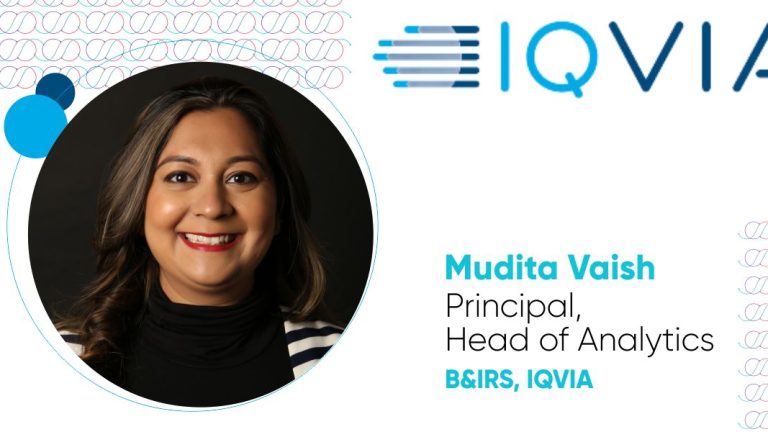Today, the volume of human health data is getting bigger by the minute. Increasingly advanced analytics is needed to break open previously hidden insights into the complexity of treating and preventing illness. Data and analytics form the backbone of the healthcare industry. With the vision to provide path-breaking insights and extraordinary contributions to the healthcare domain, IQVIA emerges as one of the world leaders in using data, technology, research, and advanced analytics to drive healthcare forward and improve patient experience – with over 74,000 experts servicing customers in more than 100 countries. Mudita Vaish is a Principal at IQVIA and is the Head of Analytics for the Brand & Integrated Research Solutions team. Her team leverages IQVIA’s connected intelligence (“integrated research”), which effectively combines IQVIA’s data assets, expertise, leading-edge patient research techniques, and advanced analytical modeling to provide data-backed recommendations.
Her Journey: An ‘Analytics’ Foundation to Lead Digital Transformations
Mudita has been working in the analytics domain since the beginning of her career. Her break into data and analytics came because of her love for numbers. Mudita was always fascinated by numbers, especially growing up when she saw her dad work with numbers as the CFO of his company. She realized at an early age that numbers and data are powerful tools to drive change. This made her gravitate toward Economics as her core area of specialization and eventually select data analytics as her full-time career. She graduated top of her class in Economics and subsequently completed her Master of Science in Economics. This was followed by her second master’s from The London School of Economics and Political Science, where she graduated with a distinction in Management and Strategy.
Mudita began her professional journey at a management consultancy as a Generalist, where she used data & analytics to solve customer pain points across different industries. Her journey into the world of data analytics as a Generalist has allowed her to be a part of some of the most amazing analytical transformations of big companies, across sectors, that continue to influence lives even today.
Mudita joined IQVIA in 2018 after working for Strategy& in the UK. She is currently, the Analytics Lead for EMEA Brand & Integrated Research Solutions (B&IRS) at IQVIA. Her team is spread across 9 countries in Europe and India where she is working to build and manage analytics teams, and develop analytics solutions, while leading client delivery.
Her Journey: Breaking Traditional Stereotypes to Reign as a Trailblazer
Mudita shares that in addition to her big experiences or achievements, she believes that there were a few small interactions or events in her life that have left a lasting impact on her as a leader. The early impressions of what her parents taught her have molded her into who she is today. She says, “My parents were the first feminists I knew who did not believe in gender-specific jobs. Whether it was plumbing, visiting the garage, or doing the dishes, everything felt equal.” These early experiences helped instill confidence in Mudita that she could do anything she wanted in her life and what she could achieve is not dependent on her gender. She recollects visiting her dad’s office, watching him work with his team, and learning from him that compassion and integrity are a leader’s biggest assets.
Mudita recalls that she has come from a family where no woman had experience working in a professional environment. She opines, “In a system, where people around you did not expect you to be much because you are a girl, I needed a lot of self-motivation, the ability to push myself, and the wholehearted support of my parents to keep going from one milestone to the next.” She became the first woman in her family to pursue higher education and relocate to the UK from India.
Her Journey: Bridging the Gender Imbalance with Right Guidance
Consulting has traditionally been a male-dominated industry, with few women in leadership positions and even fewer women making Partners, says Mudita. She recalls that early on in her career, she was one of the few women in the engineering-based coding and analytics industry. In such a situation, finding women role models for inspiration was challenging. It took her a while to find mentors who helped identify and strengthen her unique skills. She accepts being fortunate enough to have found coaches, who not only helped her professionally but also took an interest in understanding her personality. Mudita highlights how this helped her understand that great leaders are not just the ones who recognize another’s professional goals but are the ones who try and reach beyond work and help them understand as a person. It is a trait that Mudita has tried to carry through the various roles she had.
The Industry Today: Embracing Disruptive Techs for Limitless Opportunities
Mudita believes that data and analytics will be at the heart of innovation in the healthcare industry in the next decade. Disruptive technologies in healthcare are all-set to change the way cures are developed and patients are treated. Focus on improved patient experience, patient-specific insights, and cures, along with a move from reactive care to preventative care are at the heart of innovations now, with richer patient-specific data from connected devices (mobile apps and wearable) providing increased opportunities.
The Industry Today: A Data-Driven Future for the Healthcare Industry
Today, the healthcare industry has more data and information at its fingertips than ever before. This explosion of data would need increasingly advanced analytics to help break open previously hidden insights. The emergence of big data to store large amounts of structured and unstructured data, along with the usage of cloud computing to analyze this data in a scalable manner, will open avenues to churn insights in an unprecedented manner.
However, she notes that with the collection, analysis, and usage of data having widespread implications, there is a responsibility on all parties involved to store and use this data in a manner that protects patients’ identities and respects their privacy.
The Industry Today: ‘Constant experimentation with New Ideas’ at the Heart of Innovation
With IQVIA, having leadership in healthcare data and analytics, Mudita’s team is well situated to drive this innovation. Her team operates in the B2B space, and their customers expect them to innovate, understand the latest trends, and develop leading-edge solutions. With increased focus on patient experience and effective leverage of health data, her team provides cutting-edge solutions that help clients become the first movers in this space.
According to her, firstly, to understand where their customers need innovation, the team analyzes customers’ current and potential future pain points by building strong relationships with their clients, keeping on top of the latest industry trends and developments, and working with clients as their partners by proactively sharing knowledge with them
Secondly, to foster innovation, her team has built a culture to incentivize team members to spend time being thought leaders in specific topics. Mudita says that she encourages her teams to experiment with new ideas while providing a safety net in case of failures as she claims that innovation and failures are two sides of the same coin and you can’t get one without the other.
Finally, by proactively sharing the team’s innovations with clients, the team can quickly collect client feedback on what works and what needs refinement, concludes Mudita.
Role of Leaders: Desired and Expected Changes in Leadership
The expectation from a leader changes over time as new generations enter the workforce and bring along with them, new value systems express Mudita. Mudita opines that being an effective leader in today’s age is a difficult skill as we need to lead diverse teams who have significantly different working styles and value systems
According to Mudita, leaders who can demonstrate inclusiveness, show vulnerability, and view an individual as a whole (acknowledging that employees’ experience goes beyond work) are able to build greater trust within their teams. Leaders are responsible for making sure that employees have equal access to opportunities at work. They must shift their mindset to focus on the individual as a whole and acknowledge that employees’ experience goes beyond work. This would mean a focus on designing holistic policies, and fluid structures and systems. She adds that they need to create an environment for the expression of ideas and to create psychologically safe spaces for employees to be able to speak freely and bring their whole selves to work.
Role of Leaders: Four Critical Attributes of an Effective Leader
According to her, the key attributes that every leader should possess are compassion, communication, prioritization, and adaptability:
Compassion: Leading people from diverse backgrounds requires leaders to have the ability to see things from many different perspectives and appreciate those point-of-views. They need to understand their employees’ view of the world and help them achieve their own (i.e., employees) definitions of success and happiness. This has especially been exacerbated in the recent COVID times – where it placed her in a position to balance caring for her colleagues and their critical work while continuing to care for the clients’ needs.
Communication: In today’s highly complex organizational structures, teams being in different locations, and working across different time zones – communication is crucial to ensure the success of these teams. Effective and transparent communication is critical in ensuring the team understand their leaders’ visions, and that they become part of the organization’s mission.
Prioritization: Mudita firmly believes that it’s the leader’s job to help and support the team to prioritize the most important things and reduce distractions/ noise for the team. Allowing the team to focus on the most critical thing and communicating what is important helps the team be extremely effective and improves motivation.
Adaptability: Organizations need to be agile, and it starts with leaders demonstrating this trait in everything they do. Leaders need to have a conviction on the ‘whys’. But on ‘hows’ and ‘what’ they need to be adaptable to find the best path for success. Being adaptable also means actively listening and always challenging the assumptions one has made. This skill is what will make a difference between either running straight into a rock wall versus pivoting to find a way around the wall.
Role of Leaders: Final Word of Wisdom for Pioneering Women Leaders
“Take risks. Find mentors. Play to your strengths,” says Mudita.
She adds that it is important to reiterate that women bring in a unique set of capabilities to a job, which at times may be different from their male colleagues, but are nonetheless equally important. It is this strength in diversity that needs to be celebrated, honed, and encouraged.
Mudita believes that women in leadership positions are crucial. They act as role models for future generations and have the opportunity to mentor and encourage women to enter sectors that were traditionally considered male-dominated domains.






Add comment